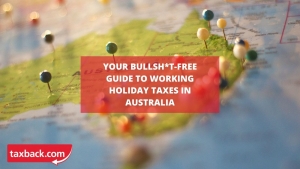Understanding the Gig Economy in Australia
Gig work has transformed how people in Australia make a living, offering flexibility, freedom, and new income streams.
What’s more, with platforms like Airtasker, Upwork, Uber, and Deliveroo leading the charge, the gig economy is flourishing!
However, gig work also brings a unique set of challenges, particularly in tax compliance and financial planning.
This guide dives into the essentials for gig workers, including the types of jobs available, tax deductions, and how to report taxes to the Australian Tax Office (ATO) and get your Australian tax return.
Types of gig economy jobs
Gig economy jobs vary widely, catering to different skills and interests.
The best gig economy jobs for you will depend on what you are interested in doing.
Popular gig work examples include:
- Freelancing: Creative and professional services such as graphic design, writing, web development, and consulting through platforms like Upwork and Fiverr.
- Rideshare and delivery services: Driving for Uber, Ola, or delivering for DoorDash and Deliveroo.
- Task-based work: Completing handyman jobs, cleaning, or assembly tasks via Airtasker.
- Tutoring and teaching: Sharing expertise through platforms like Superprof or online course websites.
- Creative and performance-based roles: Musicians, photographers, and artists finding short-term gigs or contracts.
However, there are plenty of gig economy examples, and this is just a few examples of some of the more popular gig economy jobs in Australia.
File your Australian tax return today
Tax deductions for gig workers
One of the most significant benefits for gig workers is the ability to claim tax deductions for expenses directly related to earning their income. Here are some common deductions:
- Vehicle and travel costs: Fuel, registration, insurance, and maintenance (if using your car for ridesharing or deliveries).
- Work equipment: Laptops, phones, and tools needed for your gigs.
- Home office expenses: Proportional electricity, internet, and even furniture costs if you work from home.
- Marketing and advertising: Website hosting, promotional material, or ads for your services.
- Professional development: Courses or training to enhance your skills.
Tip: Keep meticulous records of receipts and logs for tax time. Using apps to track expenses can be a game-changer.
Check out this blog that offers an in-depth look into expenses and deductions you can claim.
Does Airtasker and Upwork report to the ATO?
Yes, platforms like Airtasker and Upwork have obligations to share data with the Australian Tax Office (ATO).
As part of the Sharing Economy Reporting Regime, these companies must report earnings by Australian gig workers.
This ensures transparency and helps the ATO track taxable income.
Gig workers should assume their income is being reported and ensure they declare all earnings. Failure to do so can result in penalties and interest charges.
Apply for Your Superannuation Refund
How to reduce taxable income for a Sole Trader
Sole traders, including many gig workers, can legally reduce their taxable income by maximising deductions.
Strategies to do this may include:
- Claim all eligible expenses: From mileage to software subscriptions.
- Prepay expenses: Pay for next year’s deductible expenses, such as insurance or rent, before June 30.
- Contribute to Superannuation: Make voluntary contributions to reduce your taxable income.
- Depreciate assets: Deduct the decline in value of assets like laptops or cars over time.
- Seek expert advice: Consult a tax professional like Taxback to ensure you're taking advantage of every opportunity!
What are the downsides of the Gig Economy?
While the gig economy offers flexibility, it comes with some drawbacks:
- Potential lack of job security: No guaranteed income or benefits like sick leave or superannuation contributions.
- Tax complexity: Managing taxes and deductions can be overwhelming without proper knowledge or tools - which is why Taxback can help you!
- Income volatility: Inconsistent earnings make budgeting challenging.
- Limited career growth: Gig work may not offer the same progression opportunities as traditional employment.
The gig economy is reshaping Australia’s workforce, offering unprecedented flexibility.
However, gig workers must understand their tax obligations and leverage deductions to maximise their income.
By staying informed and proactive, gig workers can get to grips with some of the unique challenges and opportunities of this dynamic economy.
For personalised advice and support with your taxes, visit Taxback today!





